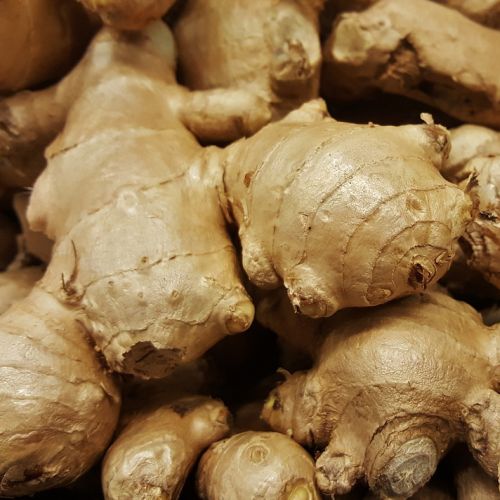
|
Ginger: The all-rounder from the Far East
The healing power of the root as a superfood for your health

'Zingiber officinale' is the scientific name for ginger, also known as 'gingiber' in medieval Latin. Ginger is a staple of Asian cuisine and herbal medicine, and slowly but surely this amazing root is gaining a following in Europe.
The unassuming looking ginger root is native to the tropics and subtropics, where it has long been used as a spice in a variety of dishes in countries such as Vietnam, India, Nigeria and China. Grated, the root has a pleasantly aromatic pungency that makes it ideal for spicy dishes. Whether you use it to spice up chicken soup or add it to sushi, ginger is a tasty addition to almost anything. It is also popular in sweet and sour dishes and as a garnish. Those who like it can also enjoy it candied, covered in fine chocolate or made into jam.
The gingerbread so popular in England is almost legendary, and ginger gives it an incomparable flavour. Ginger tea is an excellent drink, especially in the colder months of the year. It is the right choice for a savoury bread or a cold soup with a special accent – there is hardly anything that is not worth experimenting with ginger. But its main value lies not in its versatility in the kitchen, but in the fact that it is a real all-rounder in Mother Nature's medicine chest. It contains essential oils, gingerol (a pungent aromatic substance), vitamin C, calcium, potassium, phosphorus and iron, to name just a few of its properties.

If ginger had a label, it might say 'fire'. In tea, it gives off a soothing warmth that lights a pleasant fire in the body, especially in winter. In some countries it is added to coffee to increase the stimulating effect of the drink. Ginger also has anti-inflammatory properties and has been used since ancient times to treat nausea and stomach problems. It is even an effective remedy for motion sickness. It has a general positive effect on the body by stimulating circulation and increasing bile production. Ginger has also traditionally been considered an aphrodisiac, probably because of its warming properties.
Ginger can have a beneficial effect on the entire digestive system, stimulating the production of both gastric juices and saliva. As one of its main properties is warming, it is becoming increasingly popular as a remedy for rheumatism, arthritis, muscle aches and colds. At the first sign of a cold, ginger tea can prevent the worst from happening, or at least make the symptoms bearable. Fresh ginger root tea is easy to make, but the effect is thoroughly soothing and healing. It also tastes great, especially with honey or sugar candy.
Recipe suggestion: Pour 150ml (medium teacup) to 250ml (large coffee mug) of boiling water over a few grams of coarsely ground ginger root, allow to infuse for about five minutes, then strain through a tea strainer. Add honey or rock sugar to taste and drink as warm as possible.
Ginger and garlic tea is an effective remedy for persistent coughs or colds that can no longer be ignored. Add one or two medium cloves of freshly grated garlic to fresh ginger (e.g. thinly sliced). Bring to the boil briefly and allow to steep for a good five minutes. You can add honey to the mixture and drink it in small sips.
Contrary to what you might expect, ginger and garlic tea is surprisingly pleasant and actually helps. Garlic, which also has antiseptic properties, is a very effective 'add-on' to this versatile tea.
© "Ginger: The all-rounder from the Far East. The healing power of the root as a superfood for your health": An article by Winfried Brumma (Pressenet), 2011. Photo credit: Ginger root, CC0 (Public Domain Licence).
– Magic is everywhere: Review of 'The Secret Garden'
– Shrinkflation: The trick of hidden price increases
– Prenatal anxiety: Generations in the shadow of crisis
Discover more articles! Use the search function:
English archive:
More reviews, book presentations and essays
2024/2025
German archive:
2024 |
2023 |
2022 |
2021 |
2020 |
2019 |
2018 |
2017 |
2016 |
2015 |
2014 |
2013 |
2012 |
2011 |
2010 |
2009
Become a writer for Pressenet! Write articles for our online magazine on trending topics such as best books to read, health and wellness, technology and gadgets, business and finance, travel and tourism, lifestyle and fashion or education and career. Info: Become an author
Sponsors and investors are welcome: If you found our articles interesting, we would be grateful for a donation. Please also recommend us to your networks. Thank you very much!
Sitemap About Privacy Policy RSS Feed





